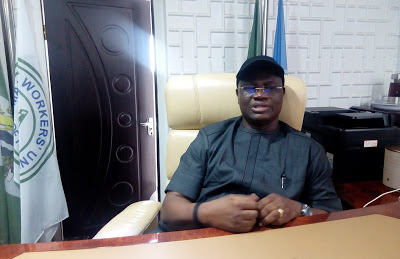Listen: From training to work environment: MWUN is tasking terminal operators on embracing global standards for members
The Maritime Workers Union of Nigeria (MWUN) has charged terminal operators in the country to adopt global standards with respect to the quality of work environment as well as continual training of their workers.
President General of the Union, Comrade Adewale Adeyanju, in an interview at the Union’s headquarters office in Lagos, applauded some terminal operators for ensuring a clean and healthy environment, while he said others were yet to comply.
“Well, I think that when they concessioned the Ports, the fear of the unknown caught all of us as leaders about how well the private investors would improve the welfare of the workers and the work environment.
”But, when you look round the environment within the ports now, some of the terminal operators have done well; go to APM Terminals, go to JosepDam that we condemned in the past that it was one of the worst terminals before, but now it is very clean, the environment is conducive for terminal operations.
“Go to Ports and Cargo, go to PTML, the environment is good and I think the workers too; environment that is good for the workers, would make them perform excellently and the throughput or input we are talking about would be increased from the terminal operations.
“The environment, I can rate it maybe 70 or 80 per cent, while some terminals are yet to bring in the standard required by international organisations. Because, any environment that is not conducive for you to work, there would be sickness and the attitude towards the job would not be encouraging.
“So, we want to use this medium to talk to all the terminal operators who are still lagging behind in terms of improving on the environment of their terminals,” Adeyanju said.
Speaking on the future of the workplace, particularly where they have their members, the Union’s President General called for the cooperation of the Nigerian Maritime Administration and Safety Agency (NIMASA) to compel operators take necessary action on training.
He said: “I think to me, the regulatory agency who happens to be in charge of the dockworkers and the seafarers; NIMASA has a long way to go in terms of improving the standard of the workers. If you have given job to private hands, you still have to do more supervisory role, as the owner of the agency. So, the training of the dockworker has been lagging behind.
“I just came back from Mozambique; I entered their Port. Their port is concessioned as well, but they have a standard; clean environment and all that you can think of, where they train their dockworkers within the port. They train their seafarers within the port and they also have very good simulators.
“If you go round our ports today, none of the terminal operators have simulators for training of their workers. How many of the terminal operators or the stevedores have engaged their workers for training, both locally and abroad; because they gave all the responsibilities to NIMASA to do. But, NIMASA is only a government regulatory agency.”
Adeyanju spoke on the importance that should be attached to training of the workers and why non-performing terminals in that regard should not be considered for jobs.
“If you are the end-users; you are the ones using the workers for your operations and making all the money. You should give them required training that would make them compete with their colleagues in other countries.
“So, the MWUN, which I am still their supervisor now, I think we want to go into all those African countries, borrow their idea, sell it to the terminal operators, putting it in jingles, because a terminal that doesn’t have training capacity, why are you giving them the job; a terminal that does not empower their workers, why are you renewing their license? A terminal that doesn’t have the love of the workers in his heart, why are you giving them jobs?
“All these things center on NIMASA that is regulating them; they are the one registering them as stevedoring contractors. You register them, but you need to sit down with the Union and ask for referral; are these terminals good to the workers? They are not doing that, because we are not politicians; they gave the jobs to some of them who are politicians, our own is to defend the welfare of our members.”
He also made it clear that while the Union has transformed and take to round-table deliberations to seek solutions to issues concerning its members, it does not hesitate to protest against ill-treatment against its members, particularly if they are relegated and treated lowly.
“But when it is coming obvious that our members are not well taken care of, that is when you see us making noise; example is what happened in APMT recently; you see the attitude of the Management of APMT that have no regard for the employers in their terminals.
“The workers remained stagnated; what should be given to them is not given to them on time, and the company was using the workers as slaves in their own country. That was what made the Union to shut down the terminal and I think we have done well on that and we are still going to improve on what we have got.”
#MaritimeRealityCheck, #AtTheMarinaToday

